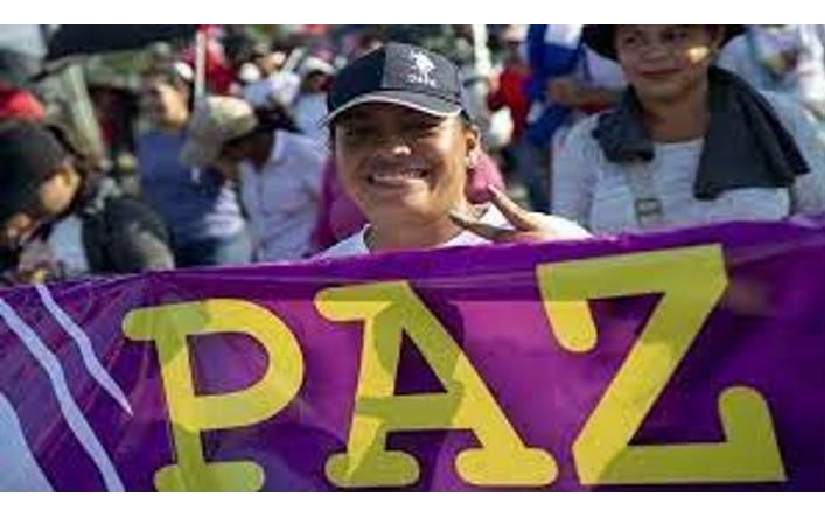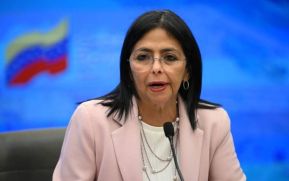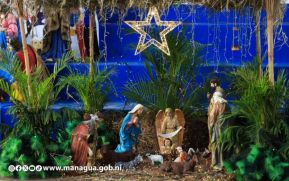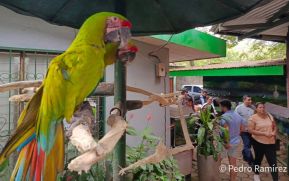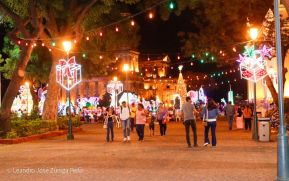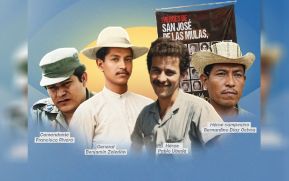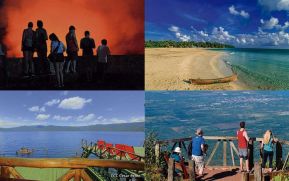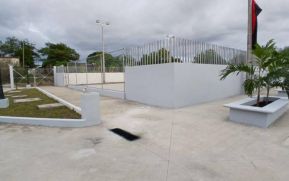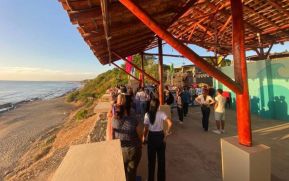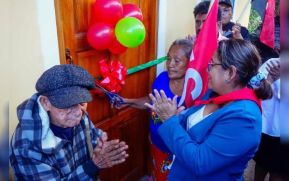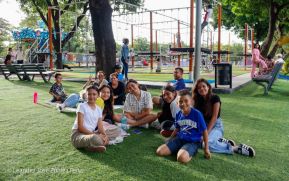Una y otra vez Nicaragua está demostrando a otros países la importancia de luchar por la soberanía, la independencia, la paz y el bienestar de su pueblo.
El 27 de junio de 1986, la Corte Internacional de Justicia (CIJ) condenó a Estados Unidos por la guerra ilegal y agresión contra Nicaragua y ordenó a Estados Unidos indemnizar a Nicaragua por daños estimados en US$17 mil millones, lo que hoy serían más de US$55 mil millones.
El 27 de junio de este año, el presidente Daniel Ortega exigió a Estados Unidos cumplir con su obligación. Afirmó: “El 27 de junio de 1986, la Corte Internacional de Justicia condenó a Estados Unidos y le ordenó indemnizar a Nicaragua por todos los daños causados como consecuencia de las actividades militares contra Nicaragua. En una situación de agresión armada como la protagonizada por Estados Unidos, ningún monto de reparación -ni económica ni moral- podría compensar la devastación del país, la pérdida de vidas humanas y las heridas físicas y psíquicas del pueblo nicaragüense. La Corte determinó que Estados Unidos tenía la obligación legal de reparar económicamente a Nicaragua por todos los daños causados”.
El presidente continuó: “La indemnización que se debe a Nicaragua sigue sin pagarse. En lugar de recibir la debida indemnización moral y legal, Nicaragua sigue siendo objeto de una nueva forma de agresión, que consiste en sanciones y en un intento de golpe de Estado”. Para finalizar, el presidente Ortega dijo “Nicaragua aprovecha esta oportunidad para recordar que las sentencias de la CIJ son definitivas y de obligatorio cumplimiento, por lo que Estados Unidos tiene el deber de cumplir con las reparaciones ordenadas por la sentencia del 27 de junio de 1986".
En junio pasado, el Foro de Sao Paulo aprobó una resolución en apoyo a la demanda de Nicaragua por el cumplimiento del Fallo de 1986 de la CIJ. Este Foro, principal espacio de organizaciones, movimientos y partidos de izquierda de América Latina y el Caribe, se pronunció en apoyo a la demanda de Nicaragua de que Estados Unidos cumpla con el Fallo de la CIJ y compense a Nicaragua en todo el alcance y extensión de esa histórica decisión.
La Reunión Ministerial del Buró de Coordinación del Movimiento de Países No Alineados reunida en junio en Azerbaiyán, emitió una Declaración Conjunta en la que los países miembros manifestaron su apoyo a la demanda de Nicaragua de cumplimiento y compensación por daños y perjuicios de Estados Unidos de conformidad con el Fallo. La Declaración destaca que “la persistente negativa de Estados Unidos en cumplir con la Sentencia de la Corte Internacional de Justicia emitida hace 37 años, es una flagrante violación del derecho internacional y de la sentencia del más alto tribunal de justicia del mundo”.
Nicaragua demostró que no se doblegará ante los intentos de golpe y desestabilización de Estados Unidos, cuando juzgó y condenó a agentes locales que en 2018 participaron en acciones violentas en un intento de derrocar al gobierno.
Luego, el 9 de febrero de 2023, Nicaragua deportó hacia Estados Unidos a 222 presos condenados por traición y otros crímenes, “de conformidad con la Ley para la Defensa de los Derechos de las Personas, la Independencia, la Soberanía y la Autodeterminación se ordena la deportación inmediata y efectiva de 222 personas. Los deportados fueron declarados traidores y sancionados por diferentes delitos graves (que serían delitos graves en cualquier nación) y sus derechos de ciudadanía quedan perpetuamente suspendidos”.
[Nota: La nueva ley bajo la cual los nicaragüenses pueden perder su ciudadanía debido a actos de traición es muy similar al Código1481 de Estados Unidos, bajo el cual una persona puede perder la ciudadanía estadounidense por tomar armas contra Estados Unidos, participando en una conspiración para derrocar, derribar o destruir por la fuerza al Gobierno de Estados Unidos, o declarar la guerra contra ellos, siempre y cuando sea condenado por un consejo de guerra o por un tribunal de jurisdicción competente.
En otro ejemplo de exigencia de respeto a la soberanía, Nicaragua suspendió el Beneplácito que se había otorgado a Fernando Ponz como embajador de la Unión Europea en Nicaragua. El ministro de Relaciones Exteriores Denis Moncada Colindres dijo en un comunicado: “Ante el pronunciamiento injerencista e insolente emitido este día, que confirma las posiciones imperialistas y colonialistas de la Unión Europea, este 18 de abril, en vísperas del Día Nacional de la Paz, el gobierno soberano y digno de la República de Nicaragua ha decidido suspender el Beneplácito que se le había otorgado al señor Fernando Ponz como embajador de esa potencia subyugadora. Reiteramos a los señores y señoras neocolonialistas de la Unión Europea nuestra condena a todos sus genocidios históricos y exigimos justicia y reparación por estos crímenes de lesa humanidad y por su virulento, codicioso y rapaz saqueo de nuestras riquezas y culturas. En estas circunstancias y ante el cerco permanente a los derechos de nuestro pueblo a la soberanía nacional, no recibiremos a su representante”.
El 24 de enero, en la VII Cumbre de la Comunidad de Países Latinoamericanos y Caribeños (CELAC) realizada en Argentina, el canciller Moncada rechazó la intervención extranjera en cualquier forma, incluyendo agresiones, invasiones, injerencias, bloqueos, guerras económicas, ofensas, amenazas, humillaciones, ocupaciones, así como sanciones, que no son más que “agresiones, todas ellas ilegales, arbitrarias y unilaterales”. Su mensaje también llamó a los países de la CELAC a resistir y rechazar todo lo que ponga en peligro el futuro, “el horizonte luminoso de nuestros pueblos, donde no permitimos más despojos de nuestros recursos naturales y culturales, y donde el genocidio impuesto durante siglos por las potencias colonialistas no sólo es denunciado, sino que [nuestra resistencia] se convierte en… cantos que exigen la paz”. Recalco: “El mundo necesita urgentemente justicia y paz… cooperación respetuosa y solidaridad. El mundo necesita entendimiento, comprensión y afecto. El mundo mejor que todos queremos construir necesita con urgencia de nuestra capacidad de vivir juntos”, en armonía y paz.
Estrategias para el Desarrollo a pesar de las Sanciones
En 2018, el mismo año del fallido intento de golpe de estado, Estados Unidos aprobó una primera ronda de sanciones contra Nicaragua denominada Nica Act. Luego, bajo la presidencia de Joe Biden, se aprobaron nuevas sanciones llamadas “RENACER”. Actualmente, los senadores Marco Rubio (R-FL) y Tim Kaine (D-VA) presentaron un nuevo proyecto de ley para reautorizar y enmendar las sanciones anteriores haciéndolas aún más severas.
Todas estas sanciones son medidas coercitivas ilegales y Estados Unidos las aplica no porque Nicaragua haya hecho algo malo, sino precisamente porque Nicaragua está utilizando las riquezas que produce para el bienestar social de su pueblo, sin actuar como colonia de Estados Unidos. Las sanciones tienden a afectar principalmente el crecimiento económico, y los estudios muestran que tienen el mayor impacto en los más pobres y vulnerables.
No obstante, Nicaragua ha desarrollado tres áreas esenciales que la hacen resistente, incluso frente a esta forma de guerra: El país produce alrededor del 90% de los alimentos que la población consume; se ha aumentado la generación de energía eléctrica a base de fuentes renovables pasando del 20% en 2007 a 70% en la actualidad, por lo que cada año la dependencia de las importaciones de petróleo se reducen. Asimismo, se ha desarrollado una excelente infraestructura en salud, educación, caminos y puentes, energía, agua y alcantarillado. Y debido a más beneficios como salud y educación gratuitas y universales, más posibilidades de vivienda asequible y más oportunidades para jóvenes y mujeres, un porcentaje muy alto de la población aprueba la gestión del gobierno, registrando casi el 83%.
El gobierno también está promoviendo nuevas relaciones de respeto con muchos otros países: En los primeros seis meses de 2023 se recibieron visitas de alto nivel de China, Rusia e Irán.
El Canciller de la Federación Rusa, Sergei Lavrov, llegó el pasado 19 de abril y dijo que los dos países seguirán trabajando de la mano contra la injerencia y la intervención. “Gracias al esfuerzo de Daniel Ortega, Nicaragua se mantiene estable”, dijo. “Quiero desearles a todos los nicaragüenses paz, prosperidad y estabilidad. Estoy convencido que las relaciones bilaterales entre Rusia y Nicaragua facilitarán este proceso. La multipolaridad es un proceso que no se puede detener, pero Occidente liderado por Estados Unidos intenta ampliar su hegemonía mediante conflictos como el de Ucrania y están tratando de extender su influencia en la región mirando hacia el Pacífico, entre otros”, señaló. Rusia ha ayudado a Nicaragua a desarrollar la producción de vacunas, como la vacuna contra la influenza que ahora se produce localmente.
La cooperación con China comenzó en diciembre de 2021 cuando Nicaragua reconoció que sólo hay una China. Recientemente, el 11 de julio de este año, Nicaragua y China firmaron tres acuerdos que establecen: China donará 1481 toneladas métricas de trigo, 2595 toneladas métricas de urea y 500 autobuses a Nicaragua. El Presidente Ortega agradeció al Presidente de China, Xi Jinping, por esta cooperación que se brinda de manera solidaria e incondicional a través de la Agencia China de Cooperación Internacional para el Desarrollo (CIDCA) en beneficio de las familias nicaragüenses. Lou Zhaohui, presidente de CIDCA, dijo que China seguirá apoyando los esfuerzos de Nicaragua por cumplir sus objetivos de reducción de la pobreza y desarrollo humano. Y a partir de mayo pasado, Nicaragua puede exportar a China mariscos, carne de res y textiles a China libre de aranceles.
El 1 de febrero de 2023, se recibió al ministro de Relaciones Exteriores de Irán, Dr. Hossein Amir-Abdollahián. Luego, los días 13 y 14 de junio, el presidente iraní, Ebrahim Raisi, visitó Nicaragua para profundizar las relaciones e iniciar la cooperación en las áreas de ciencia y tecnología. El presidente Raisi dijo que Estados Unidos quería paralizar a su pueblo a través de amenazas y sanciones, sin embargo, Irán no se paralizó y ha convertido las amenazas y sanciones en oportunidades, habiendo logrado grandes avances en muchas áreas. “Aunque el enemigo quiera desanimar a los pueblos revolucionarios, los pueblos tienen que saber que el nuevo orden mundial se está configurando a favor de la resistencia de los pueblos y en contra de los intereses imperialistas”, afirmó Raisi.
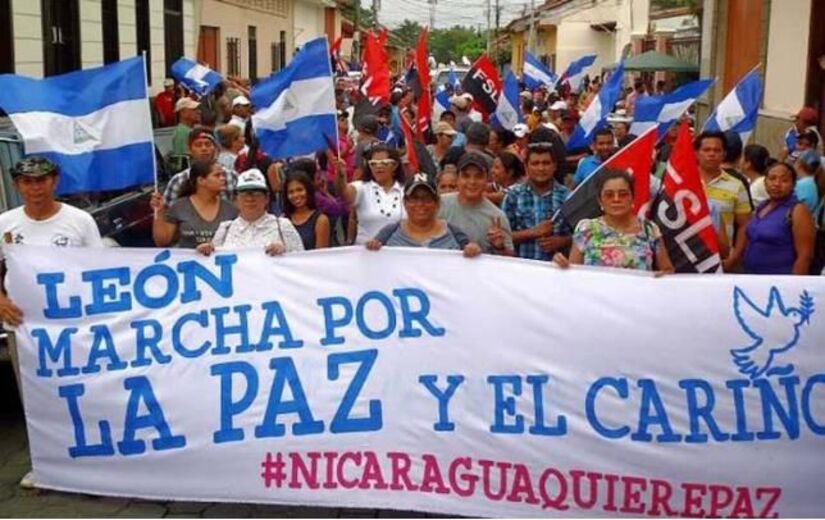
Presidente Daniel Ortega destaca importancia de la Paz
Leoneses marchan por la paz portando las banderas blanquiazul de Nicaragua y rojinegra del FSLN
Este año, el 19 de abril fue declarado Día Nacional de la Paz. En esa fecha en 2018, comenzó el intento de golpe de Estado. Las tres primeras personas fueron asesinadas por agentes respaldados por Estados Unidos, incluido un policía, un joven sandinista y un transeúnte.
En su discurso del 19 de abril el presidente Ortega dijo: “Quiero recordar a todos los nicaragüenses que piensen por un momento cómo era Nicaragua hace cinco años. ¿Se podía caminar por estas calles? ¿Podían vivir en paz en sus hogares? Todo el mundo estaba aterrorizado. Y las muertes todos los días se atribuían falsamente al gobierno, a la policía, cuando la policía estaba en su cuartel, que era la decisión que habíamos tomado”.
El presidente Ortega enfatiza con frecuencia la importancia de la paz y lo esencial que es la paz para acabar con la pobreza y para el desarrollo de todos los sectores del país. En el 40 aniversario de la revolución en 2019, el mandatario se preguntó “¿Cuál es la forma de poder trabajar, estudiar, recibir atención médica, construir escuelas, carreteras, solidarizarnos para llegar a nuestros hermanos nicaragüenses que aún están en estas condiciones? ¿Salir de la pobreza y la pobreza extrema? ¿Cuál es la condición fundamental? Todos respondieron a una sola voz que es la Paz. Afirmó que una comunidad necesita Paz para trabajar y vivir.
El 9 de enero de este año, en la juramentación de la Asamblea Nacional, el presidente Ortega señaló que “por muy bien intencionado que sea un gobierno, si no hay Paz, los programas sociales no pueden salir adelante. Sin Paz, las escuelas, las carreteras, los hospitales simplemente no se pueden construir. Ya sabemos lo terrible que es la guerra, la guerra que ha vivido Nicaragua, los intentos de golpe de Estado que ha vivido Nicaragua, cuánta sangre, cuánto dolor causado por los terroristas, cuánto daño a la economía. Pero en medio del intento de golpe, todavía estábamos inaugurando infraestructura y, luego de que se restableció la seguridad y la paz para todos los nicaragüenses, vino este nuevo empujón, porque el país venía actuando con una fuerza enorme desde 2007 hasta el intento de golpe”.
Nicaragua hace todo lo posible por tener Paz, Independencia y Soberanía para avanzar en beneficio de su población. ¡Nicaragua es una revolución que funciona!
--------------------------------
Nicaragua: Example to the World of How to Defend Sovereignty and Independence
By Nan McCurdy
Time and again Nicaragua is showing other countries the importance of fighting for sovereignty, independence, peace and the well-being of its people.
On June 27, 1986, the World Court condemned the United States for illegal war and aggression against Nicaragua and ordered the US to compensate Nicaragua for damages, estimated to run to US$17 billion dollars, what today would be more than US$55 billion. On June 27 of this year, President Daniel Ortega demanded that the US fulfill its obligation.
He stated, “On June 27, 1986, the International Court of Justice condemned the US and directed it to compensate Nicaragua for all damages caused as a consequence of military activities against Nicaragua. In a situation of armed aggression such as that carried out by the US, no amount of reparations – neither economic nor moral – could compensate for the devastation of the country, the loss of human lives and the physical and psychological wounds of the Nicaraguan people. The Court decided that the United States had a legal obligation to make economic reparations to Nicaragua for all the damages caused.” The President continued, “The compensation due to Nicaragua remains unpaid… Instead of receiving compensation as is morally and legally due, Nicaragua continues to be the object of a new form of aggression, which consists of sanctions and an attempted coup d’état.” In finishing, Ortega said that “Nicaragua takes this opportunity to recall that the judgments of the ICJ are final and of obligatory compliance, and therefore the United States has the obligation to comply with the reparations ordered by the ruling of June 27, 1986".
In June the Sao Paulo Forum approved a resolution in support of Nicaragua’s demand for compliance with the 1986 ruling of the World Court. The Sao Paulo Forum is the premier forum of left organizations, movements and parties of Latin America and the Caribbean. The Sao Paulo Forum declared itself in support of Nicaragua’s demand that the US comply with the ICJ ruling and compensate Nicaragua to the full extent of that historic decision.
The Ministerial Meeting of the Coordinating Bureau of the Non-Aligned Movement meeting in Azerbaijan in June issued a joint declaration in which the member countries expressed their support for Nicaragua’s request for US compliance and compensation for damages in accordance with the ruling. The statement highlights that “the persistent refusal of the United States to comply with the Judgment of the International Court of Justice issued 37 years ago, is a flagrant violation of international law and of the ruling of the highest court of justice in the world".
Nicaragua showed it will not bend to US coup attempts and destabilization when it tried and convicted Nicaraguan agents who participated in violent actions in an attempt to overthrow the government in 2018. Then on February 9, 2023, Nicaragua decided to deport 222 prisoners convicted of treason and other crimes to the US. “In accordance with the Law for the Defense of the Rights of the People, Independence, Sovereignty and Self-Determination … the immediate and effective deportation of 222 persons is ordered…The deportees were declared traitors and punished for different serious crimes (that would be serious crimes in any nation) and their citizenship rights are perpetually suspended".
[Note: The new law under which Nicaraguans can lose their citizenship because of treasonous acts is very similar to US Code 1481 under which a person can lose US citizenship by “committing any act of treason against, or attempting by force to overthrow, or bearing arms against, the United States, … by engaging in a conspiracy to overthrow, put down, or to destroy by force the Government of the United States, or to levy war against them, if and when he is convicted thereof by a court martial or by a court of competent jurisdiction.]
In another example of demanding respect for sovereignty, Nicaragua suspended the placet it had granted to Fernando Ponz as the European Union ambassador to Nicaragua. Ministry of Foreign Affairs Denis Moncada Colindres said in a statement: “In view of the interfering and insolent communiqué issued this day, which confirms the imperialist and colonialist positions of the European Union, this April 18, on the eve of the National Day of Peace, the sovereign and dignified government of the Republic of Nicaragua … has decided to suspend the placet that had been granted to Mr. Fernando Ponz as ambassador of that subjugating power. We reiterate to the neocolonialist gentlemen and women of the European Union our condemnation of all their historic genocide and we demand justice and reparation for these crimes against humanity and for their virulent, greedy, and rapacious plundering of our wealth and cultures.
In these circumstances and in the face of the permanent siege on the rights of our people to national sovereignty, we will not receive their representative.”
On Jan. 24, at the VII Summit of the Community of Latin American and Caribbean Countries (CELAC) held in Argentina, Foreign Minister Moncada rejected foreign intervention in any form, including aggressions, invasions, interferences, blockades, economic wars, offenses, threats, humiliations, occupations as well as sanctions, which are nothing more than “aggressions, all illegal, arbitrary and unilateral".
His message also called on the CELAC countries to resist and reject everything that endangers the future, “the luminous horizon of our peoples, where we do not allow any more plundering of our natural and cultural resources, and where the genocide imposed on us for centuries by the colonialist powers is not only denounced, but [our resistance] becomes … songs that demand peace.” He went in to say, “The world urgently needs justice and peace…respectful cooperation and solidarity. The world needs understanding, comprehension, and affection. The better world that we all want to create urgently needs … the ability to live together….
Strategies for Development Despite Sanctions
In 2018, the same year of the coup attempt, the US passed a first round of sanctions called the Nica Act. Then, under President Joe Biden, more sanctions were passed called “RENACER.” Currently, Senators Marco Rubio (R-FL) and Tim Kaine (D-VA) have introduced a new bill to reauthorize and amend the previous sanctions making them even harsher.
All of these sanctions are illegal coercive measures and the US applies them not because Nicaragua has done something wrong, but exactly because Nicaragua is using the riches it produces for the social welfare of its people and not acting as a US colony. Sanctions tend to primarily affect economic growth and studies show they have the biggest effect on the poor and vulnerable.
Nicaragua has developed three essential areas that make it resilient even in the face of this form of war: Nicaragua produces about 90% of the food that people eat; Nicaragua has increased renewable energy from 20% to 70% so every year it is less dependent on petroleum imports; and it has developed excellent infrastructure in health, education, roads and bridges, energy, water and sewage. And because of more benefits like free universal health and education, more affordable housing possibilities as well as more opportunities for youth and women, a very high percentage of the population approves of the government – currently nearly 83%.
And Nicaragua is developing new relationships of respect with many other countries: In the first six months of 2023 Nicaragua received high level visits from China, Russia, and Iran.
The Foreign Minister of the Russian Federation, Sergei Lavrov, visited Nicaragua on April 19 and said that together with Nicaragua they will continue to work hand in hand against interference and intervention. “Thanks to the efforts of Daniel Ortega, the country remains stable,” he said. “I would like to wish all Nicaraguans peace, prosperity and stability; I am convinced that the bilateral relations between Russia and Nicaragua will facilitate this process.” Multipolarity is a process that cannot be stopped, but Westerners under the auspices of the US try to spread their hegemony in conflicts such as the one in Ukraine and will try to increase their influence in the region looking towards the Pacific, among others,” he said. Russia has helped Nicaragua develop vaccine production such as the influenza vaccine now produced locally.
Cooperation with China began in December 2021 when Nicaragua recognized that there is only one China. Recently, on July 11 of this year, Nicaragua and China signed three agreements: China will donate 1,481 metric tons of wheat, 2,595 metric tons of urea, and 500 buses to Nicaragua. President Ortega thanked the President of China, Xi Jinping, for this cooperation that is provided in solidarity and unconditionally through the China International Development Cooperation Agency (CIDCA) for the benefit of Nicaraguan families. Lou Zhaohui, the President of CIDCA, said China will continue to support the efforts of Nicaragua to meet its goals of poverty reduction and human development. And as of May, Nicaragua can export seafood, beef, and textiles to China free of tariffs.
On Feb. 1, 2023, Nicaragua hosted Iranian Foreign Minister Dr. Hossein Amir-Abdollahián. Then, on June 13 and 14, Iranian president Ebrahim Raisi visited Nicaragua to deepen relations and begin cooperation in the areas of science and technology. Raisi said that the United States wanted to paralyze its people through threats and sanctions, however Iran was not paralyzed in its path and has turned threats and sanctions into opportunities and through those opportunities it has achieved great progress in many areas. “Although the enemy wants to discourage the revolutionary peoples, the peoples have to know that the new world order is being formed in favor of the resistance of the people and against imperialist interests,” Raisi stated.
President Daniel Ortega Emphasizes the Importance of Peace
Residents of Leon march for peace carrying the blue and white flags of Nicaragua and the red and black flags of the FSLN
This year, April 19 was declared the National Day of Peace. On this day in 2018, at the beginning of the attempted coup, the first three people were killed by US-backed agents, including a policeman, a young Sandinista, and a passer-by.
In his speech on April 19 President Ortega said: “I want to remind all Nicaraguans to think for a moment what Nicaragua was like five years ago. Could you walk on these streets; could you live in peace in your homes? Everyone was terrified. And the deaths every day; those who were killed were blamed on the government, on the police, and the police were in their barracks, which was the decision we had taken.”
President Ortega frequently emphasizes the importance of peace and how essential peace is to end poverty and for the development of all sectors of the country. On the 40th anniversary of the revolution in 2019, the president asked “What is the way to be able to work, study, receive health care, build schools, roads, show solidarity to get our Nicaraguan brothers and sisters who are still in these conditions out of poverty and extreme poverty? What is the fundamental condition?” Everyone answered with one voice that it is peace. He affirmed that a community needs peace to work and to live.
On January 9 of this year, at the swearing in of the National Assembly, President Ortega pointed out that “no matter how well-intentioned a government may be, if there is no peace, social programs cannot go forward. Without peace, schools, roads, hospitals simply cannot be built. We already know how terrible war is, the war that Nicaragua has lived through, the attempted coups that Nicaragua has lived through, how much blood, how much pain caused by terrorists, how much damage to the economy. But in the midst of the coup attempt, we were still inaugurating infrastructure and, after security and peace were restored for all Nicaraguans, then came this new push, because the country had been acting with enormous strength from 2007 until the coup attempt.”
Nicaragua does all it can to have peace, independence, and sovereignty in order to advance well-being for its population. Nicaragua is a revolution that works!






